Digital Badges
UW Bothell Herbarium Digital Badges
The University of Washington (UW) Bothell Herbarium is a plant lab that collects, preserves, and stores plants specimens for later use in study and research. The practice of herbaria and cataloging specimens dates back to the 18th century.

To keep track and also celebrate contributions of volunteers, we now offer seven digital badges to volunteers for their time contributed or by plant identification competency. Time badges for 15 or 25+ hours are awarded per quarter on the last day of each quarter. Competency badges can be tested for when the volunteer feels like they are ready and is usually scheduled with other volunteers testing for the same badge.
Herbarium Volunteer Skills Developed
- Attention To Detail
- Decision Making
- Environment/ecological Skills
- Environmental Awareness
- Logic Skills
- Plant Identification
- Restoration Plant Uses
Co-curricular badges are given to students/volunteers by an Office or Department, at the University of Washington Bothell, and are not part of student’s official academic transcript.
Badge types
By Volunteer Hours
Plant ID by Competency/Testing
- PNW Trees and Shrubs
- PNW Wetland Emergent Plants
- PNW Weeds
- PNW Estuarine Plants
- PNW Wetland Graminoids
Digital Badges for Time Volunteered
Volunteer Activities May Include the following:
- Guided walks in natural areas including surveying and observing plant and animal habitats.
- Developing species plant lists for locations and publishing on statewide database: www.wnps.org/plantlists.
- Collecting plants, documenting the specimen’s morphology, and taking an ecological snapshot of soil, plant communities, and environment.
- After collection, participants use different techniques to press and/or preserve the plant.
- Participants assist in identifying the plant and create the informational placard. Information about the collection is entered into the herbarium database.
- Participants glue the dried specimen to paper and attach placard.
- Participate in photographing and digitizing the collection to be viewed on regional database online at pnwherbaria.org.
- Database entry of specimens that were procured from other herbaria. Assist with community events and tours, such as youth science camps, large classroom tours, or tabling at school events.
- Time spent collecting or identifying specimens outside of scheduled herbarium sessions count toward the volunteer hours when the specimen is added to the collection.

UWB Herbarium: 15 Hours Volunteer
What it takes to earn this badge
Participant completed 15 hours of volunteer time at the UW Bothell Herbarium; time validated by the Herbarium Collections Manager.
UWB Herbarium: 25 Hours Volunteer

What it takes to earn this badge
Participant completed 25 hours of volunteer time at the UW Bothell Herbarium; time validated by the Herbarium Collections Manager.
Digital Badges for Plant ID – Competency
UWB Herbarium: PNW Trees and Shrubs ID
The UW Bothell Herbarium provides an opportunity for herbarium volunteers to test their knowledge of common trees and shrubs in the Puget Sound lowlands.
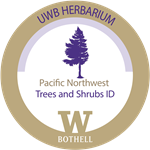
What it takes to earn this badge
- Herbarium participants must go on field days/nature walks where they are introduced to tree and shrub species in the wetland, on campus, or in local parks. In the lab, they also can view pressed and preserved specimens in the cabinet, and have access to keys and field guides.
- Identify 16 out of 20 live or pressed plant specimens correctly (80%) in 60 minutes. Exam is given as a practicum, with one plant per station. Students rotate through the stations, averaging 3 minutes with each specimen.
- Species list (subject to change): Abies grandis, Acer circinatum, Acer macrophyllum, Alnus rubra, Arbutus menziesii, Betula papyrifera, Cornus sericea, Corylus cornuta, Crataegus douglasii, Frangula purshiana, Fraxinus latifolia, Lonicera involucrata, Malus fusca, Oemleria cerasiformis, Physocarpus capitatus, Picea sitchensis, Pinus contorta var. contorta, Pinus monticola, Populus trichocarpa, Populus tremuloides, Prunus emarginata, Pseudotsuga menziesii, Rosa gymnocarpa, Rosa nutkana, Rosa pisocarpa, Rubus spectabilis, Salix lasiandra ssp. lasiandra, Salix scouleriana, Salix sitchensis, Sambucus racemosa, Spiraea douglasii, Symphoricarpos alba, Taxus brevifolia, Thuja plicata, Tsuga heterophylla.
UWB Herbarium: PNW Wetland Emergent Plants ID
The UW Bothell Herbarium provides an opportunity for herbarium volunteers to test their knowledge of common trees and shrubs in the Puget Sound lowlands.
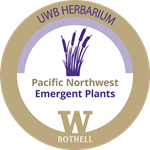
What it takes to earn this badge
- Herbarium participants must go on field days/nature walks where they are introduced to tree and shrub species in the wetland, on campus, or in local parks. In the lab, they also can view pressed and preserved specimens in the cabinet, and have access to keys and field guides.
- Identify 12 out of 15 live or pressed plant specimens correctly (80%) in 60 minutes. Exam is given as a practicum, with one plant per station. Students rotate through the stations, averaging 3 minutes with each specimen.
- Species list (subject to change): Alisma triviale, Athyrium filix-femina, Brasenia schreberi, Comarum palustre, Callitriche heterophylla, Equisetum arvense, Gallium aparine, Geum macrophyllum, Iris pseudacorus, Lycopus americanus, Lysichiton americanus, Myosotis scorpiodes, Myosotis laxa, Nuphar polysepala, Oenanthe sarmentosa, Persicaria hydropiperoides, Rumex occidentalis, Sagittaria latifolia, Scutellaria lateriflora, Sparganium angustifolium, Sparganium emersum, Tellima grandiflora, Typha latifolia, Urtica dioica, Veronica anagallis-aquatica.
UWB Herbarium: PNW Weeds ID
The UW Bothell Herbarium provides an opportunity for herbarium volunteers to test their knowledge of common noxious weeds and non-native plants in the Puget Sound lowlands.
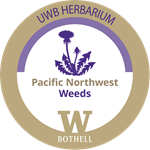
What it takes to earn this badge
- Herbarium participants must go on field days/nature walks where they are introduced to tree and shrub species in the wetland, on campus, or in local parks. In the lab, they also can view pressed and preserved specimens in the cabinet, and have access to keys and field guides.
- Identify 16 out of 20 live or pressed plant specimens correctly (80%) in 60 minutes. Exam is given as a practicum, with one plant per station. Students rotate through the stations, averaging 3 minutes with each specimen.
- Species list (subject to change): Buddleia davidii, Chenopodium album, Cirsium vulgare, Clematis vitalbe, Conium maculatum, Cytisus scoparius, Crataegus monogyna, Daucus carota, Geranium mole, Geranium robertianum, Hedera helix, Hypericum perforatum, Ilex aquifolium, Impatiens capensis, Jacobaea vulgaris, Lactuca serriola, Lamium purpureum, Lapsana communis, Lythrum salicaria, Matricaria discoidea, Medicago lupulina, Nymphaea odorata, Phalaris arundinacae, Polygonum persicaria, Polygonum cuspidatum, Ranunculus repens, Rubus bifrons, Rubus laciniatus, Solanum dulcamara, Taraxacum officinale.
UWB Herbarium: PNW Estuarine Plants ID
The UW Bothell Herbarium provides an opportunity for herbarium volunteers to test their knowledge of common estuarine emergent plants in the Puget Sound lowlands.
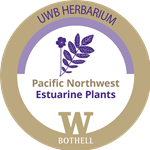
What it takes to earn this badge
- Herbarium participants must go on field days/nature walks where they are introduced to estuarine/coastal plants in the Puget Sound area. In the lab, they also can view pressed and preserved specimens in the cabinet, and have access to keys and field guides.
- Identify 12 out of 15 live or pressed plant specimens correctly (80%) in 60 minutes. Exam is given as a practicum, with one plant per station. Students rotate through the stations, averaging 4 minutes with each specimen.
- Species list (subject to change): Agrostis stolonifera, Ammophila arenaria, Aster subspicatus, Bolboschoenus maritumus, Carex lyngbyei, Cotula coronopifolia, Distichlis spicata, Juncus balticus, Leymus mollis, Lilaeopsis occidentalis, Myrica gale, Plantago maritima, Potentilla anserina ssp. pacifica, Rumex occidentalis, Salix hookeriana, Schoenoplectus acutus, Schoenoplectus pungens, Triglochin maritima, Typha angustifolia, Typha latifolia.
UWB Herbarium: PNW Wetland Graminoids
The UW Bothell Herbarium provides an opportunity for herbarium volunteers to test their knowledge of common wetland sedges, rushes, and grasses in the Puget Sound lowlands.
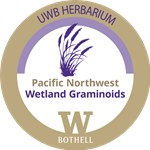
What it takes to earn this badge
- Herbarium participants must go on field days/nature walks where they are introduced to tree and shrub species in the wetland, on campus, or in local parks. In the lab, they also can view pressed and preserved specimens in the cabinet, and have access to keys and field guides.
- Identify 12 out of 15 live or pressed plant specimens correctly (80%) in 60 minutes. Exam is given as a practicum, with one plant per station. Students rotate through the stations, averaging 4 minutes with each specimen.
- Species list (subject to change): Alopecurus pratensis, Anthoxanthum odoratum, Carex amplifolia, Carex obnupta, Carex stipata, Carex utriculata, Carex vulpinoidea, Deschampsia cespitosa, Eleocharis palustris, Elymus glaucus, Glyceria elata, Holcus lanatus, Juncus acuminatus, Juncus effuses, Juncus ensifolius, Phalaris arundinacae, Phleum pretense, Schoenoplectus acutus, Scirpus atrocinctus, Scirpus microcarpus.
